- Home
- Henry David Thoreau
The Essays of Henry D. Thoreau Page 3
The Essays of Henry D. Thoreau Read online
Page 3
Thinking back on what might have induced this dream, Thoreau remembers that he had been reading a book about the Northmen the night before and that as he read he felt “a fertile regret” and derived “an inexpressible satisfaction” from that feeling.
Here “memory” seems to be the name of the faculty of mind that, if purified, might know what we do not know and express itself in poetry or music. But it is not quite available, at least not in daylight. Each of us has had the experience of being on the verge of uttering a thought, then being distracted and forgetting what we had to say, then being madly haunted by the ghost of what was so clearly present a moment ago. Imagine living a life suffused with that feeling. Imagine having the sense that you have come here to say something only to find it has slipped your mind. Worse yet, imagine such is the case but that you do not even feel the loss. Thoreau finds his regret satisfying and fertile because it indicates some loss is felt and thus implies there was something to be lost. This “fertile sadness,” as he elsewhere calls it, contains a sort of backward promise, a hope that arises because something has been taken away. The literary critic Barbara Johnson writes that it was Thoreau’s great gift to wake us to “our own lost losses.” Not losses simply—we all have those—but the losses we do not even remember. This prophet speaks to wake his neighbors but not, once they are awake, to tell them any assertable truth. Wakefulness in Thoreau is not a perception of truth; it is a perception of ignorance and comes suffused with promising regret.
III. SIGNING OFF
Thoreau’s politics may be described as an experiment in seeing how far the via negativa might be extended to social life. In Walden, remembering the one time he thought of buying a farm, he writes: “My imagination carried me so far that I even had the refusal of several farms,—the refusal was all I wanted,—but I never got my fingers burned by actual possession.” This is a wry assertion of his creed, his constant questions being, How much of what the world expects might we simply refuse to do? How many obligations and inherited institutions might we drop so as to clear the field (for what?—well, for what has yet to be imagined)?
In public refusal, Thoreau exercises the political version of his talent for perspective, for finding a place to stand outside the common frame. His critique of professional politicians is that they rarely think of quitting their jobs, which is the only way they could get in a position to imagine a fundamentally new world. Instead, they dwell inside their own assumptions and run in circles. As he writes in “Civil Disobedience”:
Statesmen and legislators, standing so completely within the institution, never distinctly and nakedly behold it. They speak of moving society, but have no resting-place without it … . [Daniel] Webster never goes behind government, and so cannot speak with authority about it.
Nature had early become Thoreau’s own favored “resting-place without.” Going to the woods was an experiment in removing himself from institutions so as to see them freshly and speak “with authority.” This is why, by the way, the present collection presents Thoreau’s essays in the order of their creation, abandoning the long-standing editorial practice of separating the political work from the natural history. That conventional division has always muted one of the things that makes Thoreau interesting: the way in which his various passions inform and influence one another. Thoreau’s “reform papers” are “excursions” and vice versa.
Thoreau’s earliest concrete political refusals can be dated to the early 1840s. He had graduated from Harvard College in 1837 and moved back to his family’s home in Concord; he had tried his hand at teaching in the local schools; he had developed a close friendship with his mentor Ralph Waldo Emerson and in 1841 had begun living in the Emerson household. Then, in 1842, when he was twenty-four years old, he stopped paying his taxes. Four years later—in 1846, the second year of his stay at Walden Pond—he was arrested for his continued tax refusal and spent a night in jail. That case has become the most famous example of Thoreau’s trying to get “behind government” by refusing to act, but a lesser-known case from 1841, mentioned in passing in “Civil Disobedience,” is in some ways more telling:
Some years ago, the State met me in behalf of the Church, and commanded me to pay a certain sum toward the support of a clergyman whose preaching my father attended, but never I myself … . I declined to pay.
We are now so used to the idea of the division of church and state that we forget it took decades to build the wall between them and that federal practice was distinct from the practice in individual states. Massachusetts in fact had an established church for many years after the Revolution, the state constitution of 1780 having authorized towns to support by taxation a “public protestant teacher of piety, religion, and morality.” The First Parish Church of Concord was supported in this way during most of Thoreau’s life. In 1834 the state moved to disestablish Massachusetts churches. By state law, however, citizens were still considered members of their parish church unless they formally resigned, and First Parish thus remained the Concord town church for decades after disestablishment. The town maintained the church building, it supplied the pastor with firewood, and it collected the parish tax. Only in 1855 did a town meeting formally declare that the “municipal corporation” would no longer do any “parochial business.”
Around the time Thoreau turned twenty-one, First Parish added his name to its rolls. A few years later, when the town sent him a church tax bill, Thoreau went to the town clerk and “signed off,” a common practice at the time. Thoreau’s mother and aunts had signed off when they had changed churches years earlier; many more had done so in 1834 when the church was disestablished. By the time Thoreau signed off, only a third of the town’s taxpayers were paying the ministerial tax.
While he may not have known it, signing off from First Parish made Thoreau part of one of the key social movements of nineteenth-century America, denominational Protestantism. The essence of denominationalism is voluntary association. In older church practice, men and women were simply born into a church and inherited its creed, rituals, and tradition. If they wished to leave, their family, their community, and oftentimes the state would make sure they did not. In nineteenth-century America, however, it became more and more important that a member of a church had chosen to belong, had at best undergone a conscious conversion to a particular way of knowing and worshiping the divine, and then joined a community as the outward expression of this inner, and individual, experience.
Actually, it overstates the case to say that by signing off Thoreau became part of this movement, for the true denominationalist signs off, then signs on somewhere else, and Thoreau never took the second step. And yet in another sense it doesn’t overstate the case, for there is no voluntary association without voluntary disassociation, and in the latter Thoreau is our patron saint. He keeps denominationalism alive by keeping himself ready for a church that does not yet exist. He is the great refuser by whose actions the rest of us know that we are choosing to do what we do. If just one family in town teaches its children at home, and the state allows it, then all who use the public schools are more clearly making a free choice; if just one draftee is allowed to be a conscientious objector, then all others must be conscientious assentors. In like manner, when Thoreau conducts the ritual of not joining, those of us who do join can rest assured we are not slaves to convention but masters of choice. Voluntary association does well to have one man or woman out there vigilantly exercising the right of refusal.
Paradoxes such as these imply that Thoreau’s nay-saying may offer more aid to conformity than is usually thought. That is probably the case, at least in the sense that American ideology never objects too much to the kind of dissent that keeps us all talking of free choice even as we all do exactly as our neighbors do. Stepping outside the frame sometimes only serves to polish it up.
But that line of thought speaks more to the uses that might be made of Thoreau than to Thoreau himself. He never used refusal to burnish conformity. He never signed on to
some other church in Concord, or to any political party (he never voted), or to any abolitionist committee, or to any of his friends’ utopian communities. There was a great flurry of socialist experiments in the 1840s—more than forty communities founded in that decade alone—and Thoreau, who had been raised in a boardinghouse, was never inclined to join: “As for these communities—I think I had rather keep bachelor’s hall in hell than go to board in heaven.” Most reformers, he thought, “want faith, and mistake their private ail for an infected atmosphere.” So doing, they set out to heal the world before they have healed themselves, like men crusading against the national debt when they themselves are bankrupt (“Paradise (To Be) Regained,” the third essay in this collection, is Thoreau’s amusing critique of one such reformer).
If reform has a positive meaning for Thoreau, it means the cure of the soul, not the cure of social ills. It means a practice like that of Christian monks in late antiquity who isolated themselves on bare and empty islands off Scotland, trying to see how far they could turn away from their own culture so as to face themselves and God. Reform by such enacted refusal is not necessarily antisocial; turning away from one’s culture is a cultural act—especially if you publish your results—one whose goal, in Thoreau’s case, is an exemplary accounting of whatever “ails” you have and, if possible, the healing, even the ripening, of the self.
But to do all that, one must live in a world that accepts the via negativa ; politically speaking, one needs a government that will let you sign off and then leave you alone. At the end of “Civil Disobedience,” Thoreau tries to imagine such a state. He recalls the historical progresssion from an “absolute to a limited monarchy, from a limited monarchy to a democracy,” and calls it “a progress toward a true respect for the individual.” His own experience with democracy, we gather, indicates that such progress had not come to an end. Beyond the democracy he knew he thus imagines a state that “would not think it inconsistent with its own repose if a few were to live aloof from it” (for example, not to pay their taxes). He pictures these men and women as a “kind of fruit” that the state would let “drop off as fast as it ripened.” Set apart from the state but nonetheless fulfilling “all the duties of neighbors and fellow-men,” these ripened souls, or rather the state that sanctioned them, “would prepare the way for a still more perfect and glorious State, which also I have imagined, but not yet anywhere seen.”
This conclusion is admittedly a little vague and faraway, meaning we have come now to the public form of fertile regret. We are in an eschatological politics—not “the art of the possible,” as politics is sometimes said to be, but the imagining of what has never been seen before. But unseen ends are well fitted to the faith we are examining. After all, we do not know what lies beyond the known; we are ignorant of what we might become if we stopped being the things we are. Thoreau is arguably the original American ecologist, but he is original exactly because there was no ecology when he went walking in the Concord woods, or went to Maine (the terms didn’t even exist until a decade after his death). His day saw an aggressive cutting of the four-hundred-year-old white pines of Maine, and it disturbed him deeply, as he explained after the second of his trips into those woods:
A pine cut down, a dead pine, is no more a pine than a dead human carcass is a man. Can he who has discovered only some of the values of whalebone and whale oil be said to have discovered the true use of the whale … ? I have been into the lumber-yard, and the carpenter’s shop, and the tannery … ; but when at length I saw the tops of the pines waving and reflecting the light at a distance high over all the rest of the forest, I realized that the former were not the highest uses of the pine. It is not their bones or hide or tallow that I love most. It is the living spirit of the tree … . It is as immortal as I am, and perchance will go to as high a heaven, there to tower above me still.
It is sometimes hard to know when one is outside the frame of the community, but in this case we have a nice proof, for when The Atlantic Monthly printed these remarks in 1858, the editor cut the final sentence (against Thoreau’s express wishes) as being too pantheistic or, as we might say now, as perceiving too well the interdependence of the species.
By moving from Thoreau’s fantasy of a state whose “aloof” citizens drop like ripe fruits to his legacy for environmentalists, I mean to indicate that while he never signed on to one of the town churches, his refusals nonetheless gave rise to a world of action. As with my model of the “prophetic excursion,” turning away may be followed by return. Thoreau was so clear about his nay-saying that his social side usually goes unnoticed, but it is there. He was an individualist, yes, but he also believed in public life, the unit of which was the town. In “Civil Disobedience” he says that there was one tax he was happy to pay: “I have never declined paying the highway tax, because I am as desirous of being a good neighbor as I am of being a bad subject.” What it means to be a neighbor is one of the great puzzles Thoreau poses for his readers; here we have a hint at the answer: it means chipping in to make the town work. This is in accord with one of the several ways in which Thoreau did in fact “sign on”—his lifelong involvement in the Concord Lyceum.
The lyceum movement was a nineteenth-century experiment in popular adult education, town lyceums being established throughout the Northeast to spread useful information by way of lectures and debates. The citizens of Concord started theirs in 1829, and twelve-year-old Thoreau joined immediately. When he was twenty, he gave his first lecture there. Shortly thereafter, for two years he served as the lyceum curator, arranging the lecture series and managing the details—the hall, the fuel, the lights, the fees. It was a central part of his life for decades. Ten of the essays collected here were first given as public lectures; two of them, “Walking” and “Life without Principle,” were given many times over many years. One of the last lectures he ever gave was a version of “Wild Apples” delivered to the Concord Lyceum in 1860.
In this and other ways Thoreau was a communitarian. He was active in the group that produced the journal The Dial and edited one issue; almost against his own will, he constantly addressed himself to the fight against slavery; in his essays and journal he imagined and wrote stirringly of the possibility of national parks—so much so that we have them today in part because people like John Muir read Thoreau and took him seriously. Which is to say that, above all, we find Thoreau “signing on” by writing books and essays. Thoreau was an individualist, to be sure, but the complaint that he was antisocial has always seemed odd to me when publication is one of the most deliberate social acts we have.
IV. SLAVERY IN MASSACHUSETTS
The most important social movement of the nineteenth century was the fight against slavery, and four of the essays here testify to Thoreau’s involvement in that struggle. Behind all of these lie what was then a national debate about whether slavery would be extended into the territories being settled in the West. In 1817, the year Thoreau was born, the Union consisted of twenty-two states, half of them prohibiting and half allowing slavery. Thereafter, however, this balance of power was regularly threatened, mostly because the Louisiana Purchase had opened vast new areas to settlement. Over the ensuing decades, each time one of the western territories applied for statehood the same questions would arise: Would this state be “Free-Soil” or not, and what then would happen to the balance of power in Congress?
The first of such debates resulted in the Missouri Compromise of 1820. When the slaveholding Missouri Territory applied to enter the Union in 1818, Northern lawmakers insisted that its admission be contingent on its abolition of slavery. Southerners refused, and the petition stalled. A year later, when Maine applied for statehood, a compromise allowed Missouri to enter as a slave state and Maine as a Free State. Moreover, and most important for the decades that followed, the compromise prohibited future slavery in any part of the Louisiana Purchase north of latitude 36°30’. Almost all of Missouri lies north of this line. So does what are now Kansas and Nebraska—thou
gh why that mattered would not become apparent for thirty-four years.
This compromise quieted things for many years, but the power struggle resurfaced as soon as new land was opened for settlement beyond the Louisiana Purchase. This territory became one focus of Thoreau’s most famous political essay, “Civil Disobedience,” first delivered as a lecture in 1848, his question there being why a citizen of Massachusetts should, in any way, help the government acquire the land in question. Thoreau’s opening paragraph speaks of “the present Mexican war,” a conflict whose roots went back to 1836, when Texas seceded from Mexico and declared itself an independent (and slaveholding) republic. In 1845 Congress annexed the territory as a new state, and in the spring of the next year the Mexican army attacked American troops on the Texas border, Mexico never having accepted Texas’s independence in the first place. The subsequent war lasted a year and a half, and by the end of it Mexico had lost not only Texas but California and all of what are now the states of the Southwest.
When Texas had first been considered for admission to the Union, abolitionists blocked the proposal, fearing that several new slave states might be created from the territory. When Texas was finally admitted and fighting broke out, Thoreau and other abolitionists opposed the war on the same ground: winning would be a victory for slavery, not for freedom.
At the close of the Mexican War, American holdings finally reached to the Pacific, and the struggle over slavery in the West played out its final acts. In 1849 California sought to join the Union. If it was to enter as a Free State, the slave states wanted something in return, and what they got was another series of torturous trade-offs. Under the Compromise of 1850, California entered as a Free State, but slavery was allowed to continue in the District of Columbia (though the slave trade itself was outlawed there), and the South got a new Fugitive Slave Law lending increased federal power to the capture and return of slaves seeking freedom in the North.

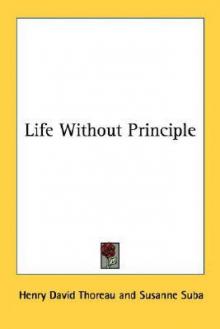 Life Without Principle
Life Without Principle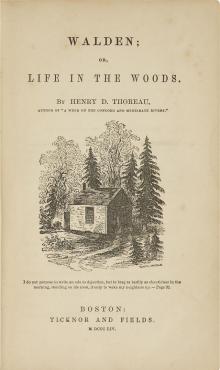 Walden
Walden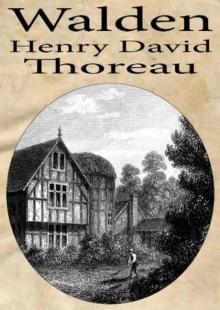 Walden by Henry David Thoreau
Walden by Henry David Thoreau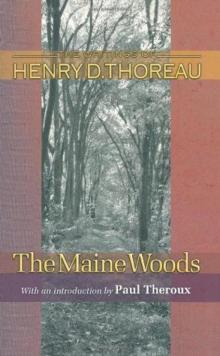 The Maine Woods (Writings of Henry D. Thoreau)
The Maine Woods (Writings of Henry D. Thoreau) The Illustrated Walden
The Illustrated Walden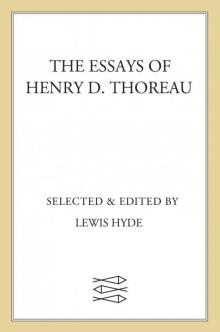 The Essays of Henry D. Thoreau
The Essays of Henry D. Thoreau